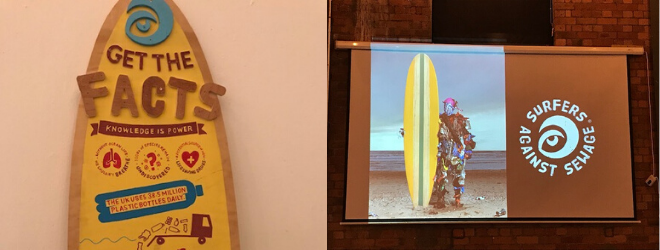Just Kampers have been proud supporters of SAS and a part of their 250 club since late 2016.
As a collective we have always believed in the need to protect the environment; like most of you our VW’s are our window to outside adventures.
Whether you swim, hike, cycle, surf, climb, kitesurf or just love being in the great outdoors. Where there are VW’s (or any type of campervan or motorhomes) there are people with a connection to, and enjoyment of, our wider environment.
In a time when post the ‘Blue Planet phenomenon’ people across the globe are more aware than ever, SAS continue to push the boundaries, raise the profile of, and inspire positive changes across a broad spectrum of issues.
What began as a group of local surfers’, sick of being sick from sewage pollution, sat in the Porthtowan village hall in 1990; has grown into the world recognised charity and body of people affecting change not just locally but on the world stage.

Two of the JK reps made the journey to join other 250 Club members at the annual 250 Club gathering; to hear and be inspired by speakers over the course of an evening in November.
These are the stories that were shared while they were there.
The first speaker was Hugo Tagholm with an update on the successes of SAS over the past year and the focus for the future.
He covered the SAS journey. What had started some 30 years previous with radical action principally focused on what was then appalling water quality in the waters around the UK.
Thankfully over those years, through that great campaigning and activism, water quality has greatly improved in that time.
Despite water quality remaining an issue of great importance to the charity it has become something that now shares the spotlight with other issues.
The biggest issues pf importance to supporters of SAS are Plastic and Climate.
SAS have been focussed on putting all the money raised by their supporters to the best possible use.

Beyond this the real changing element has been the hands-on approach taking place on beach fronts and rivers. What started as a handful of people monitoring and tackling plastic pollution; this year became 100,000 people on the front line mobilised and inspired.
It is this radical resistance behaviour that changes government and industry, as they see and experience the importance of the issues as demonstrated by the will of the people.
This all starts at the beach front.
Plastic Free Communities – the goal was to achieve 125 plastic free communities by 2020. There are already 650 working towards plastic free community status. SAS are working within those communities; with businesses, schools and individuals to end the scourge of single use plastics.
The SAS schools programme is hugely successful – something that brings challenges to the team delivering it. This has led to more than 750,000 mini activists across the country. The programme has been selected by the government as its choice of scheme for schools, and, to help it deliver its target of all schools being Single Use Plastic Free by 2020.
On Climate Hugo acknowledged the impact that Greta Thunberg has had. Inspiring a sense of urgency and activism. Increasing media focus in a sustained and educational way. She has highlighted a need to maintain this momentum. And made it much more difficult for those in power to ignore the immediacy with which lasting, meaningful action is required.
Oceans and climate are inexplicably linked.
SAS campaigners have been demonstrating outside Westminster many times with their campaigns.
Hugo recalled the towing of ‘The Creature’, the focus of an SAS film, by a black van with the word ANARCHY printed on the side. How it subsequently gave rise to some very interesting moments with armed police – all was well after a thorough conversation and they were able to proceed. (Whilst making mental notes never to use such a vehicle again!)

The most obvious and pleasing element to all of this is that people are really responding. There has been an undeniable evolution in peoples focus, and, the importance that is subsequently being placed against it.
Water quality is once again an issue. Whilst things have undeniably improved since the beginnings of SAS. The issue has become a further source of concern since the SAS Water Quality report was released in 2019, showing that water companies are performing consistently badly.
SAS tracked and reported on 1784 sewage pollution events during 2019 during the ‘bathing season’ (the period from May – September – as due to legislation this is the only period when water quality testing is a requirement.)
This year Southern Water received record fines of £126 million for serious failings in their sewage treatment works and deliberately misreporting its water quality performance. Despite record fines it was still responsible for the most sewage pollution events on 2019 with over 571 reported.
The temptation may well be to accept the fines rather than seek to rectify the source of the problem.
Media coverage of the work and the issues has been important in highlighting the issues. As they become more visible as headline news, the people who can create change through government have begun to not just listen, but act.
These people have the power to protect our environment in a much bigger way – they have the power to legislate to ensure its protection.
An issue that is of great importance as much of our environmental protections are governed by EU legislation. It’s important that this is not lost in the future – and if anything is more robustly provided with new legislation.
The Ocean Conservation All-Party Parliamentary Group has brought together over 80 MP’s who share an interest in marine conservation issues. They continue to provide a platform for SAS and work with their influence to act to protect our environment and oceans.

The Climate movement has indicated that we have 12 years to save the planet and ourselves.
SAS are focussing on 10 years to save the oceans. This coincides with the UN Decade of Ocean Science for Sustainable Development. We have a decade to re-double our efforts and protect our oceans for the future.
There have been big wins; the deposit return system, the plastic bag charge and improvements in bathing water in rivers and oceans.
The future goals;
No more sewage incidents by 2030
End to plastic pollution on beaches by 2030
Net 0% carbon emissions by 2030
Stronger protections for marine protected areas (UK and worldwide) by 2030
It will undoubtedly be a challenge but it’s about people coming together. Influencing the hearts and minds of the people at the very top.
The bigger the network, the better the impact, the energy, the passion and enthusiasm to create positive, lasting change.



